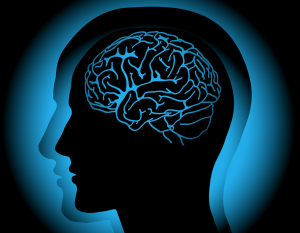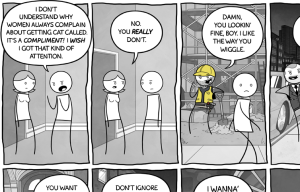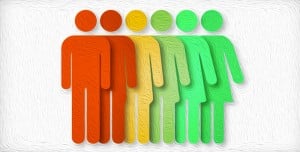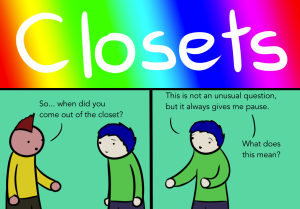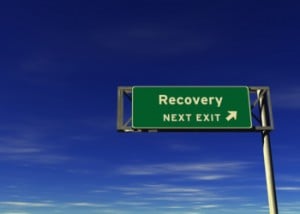
Source: Voices 4 Hope
Originally published on Adios Barbie and cross-posted here with their permission.
September first was my one-year anniversary.
Not a romantic anniversary with a candlelit dinner and diamond earrings. The one-year anniversary of my recovery from an eating disorder.
I don’t know if taking a day to celebrate the recovery process is common, but I wanted to commemorate the year I began taking care of myself.
I’d thought I was taking care of myself before – avoiding weight gain, exercising, eliminating “bad” foods. In the name of getting healthy, I reached what looked to be the point of no return.
Operative words being “looked to be.”
Here I am, one year later, at or near my body’s set point (my body’s natural, comfortable weight). All my blood work comes back consistently normal. I can run up stairs without getting tired now, and I don’t wear hooded sweatshirts in 80-degree heat anymore.
I think celebrating a different kind of health is worth it.
There are plenty of resources for people beginning recovery from any kind of eating disorder.
NEDA provides an extensive list to get you started. Doctors, therapists, nutritionists, and well-meaning friends and family might be present at every turn, or they might not be. And yet, it’s still difficult to get a straight answer for the most pressing question on people’s minds.
What is recovery going to look like? Will it go on like this forever? Will I be strong enough to make it?
My experience was my own, and I can’t pretend that it will ring true to every person beginning a recovery journey. But I think this episode of “Mythbusters: Eating Disorder Edition,” if you will, is pretty universal.
Take it from me: This article is not a magic spell.
Recovery is hard.
But it doesn’t need to be any harder than it has to be.
Myth #1: You need to meet with a full treatment team three times a week, or you don’t really want to recover. And if you don’t want it, you’ll never get better.
Truth: You probably do need support, but what form that takes is up to you.
Recovering from an eating disorder isn’t easy. If it were, we wouldn’t need to talk about it. And as with any difficult life issue, it helps to have people on your side.
But support looks different for everybody.
If you don’t meet regularly with a physician, a therapist, a nutritionist, and a psychiatrist, that doesn’t mean that you don’t want to get better or that you’re not trying.
It just means that your needs are different from other people’s needs.
Some people benefit from in-patient treatment centers. Others try out-patient programs at hospitals or other facilities. Some meet with a therapist a few times a week, go in for nutritional counseling, or try to go it on their own with family and friends on their side.
I’m not suggesting that anyone should discount therapy or nutritional counseling. They’re valuable techniques that help many people sort out complicated problems. By all means, give them a go.
But recovery and treatment are not one-size-fits-all.
Use your voice, not your eating disorder’s, to direct your life.
Doing recovery your way (whatever way that is) means you’re beginning to take charge.
For many, this comes with some kind of professional help or guidance from a trusted therapist.
But the biggest change has to come from within.
Find the help that works for you, and don’t give up.
Myth #2: Shifts in weight will happen at a rate of X pounds/week.
Truth: Honestly? Who the heck knows?
Not all eating disorders result in a drastic change in body weight. But some do.
Whether you are hoping to lose weight after fighting with BED, gain weight after anorexia, or settle into your body’s set point and a regular pattern of eating after any eating disorder, your body is influenced by a number of factors.
The duration of your disorder. Your height. Your family history and genetics. Your body type. Your metabolism. Your current level of stress. Heck, your sodium levels and how much you tend to sweat.
Your set point isn’t something that can be predicted. Bodies change with age and life circumstances, hormones and stress.
I had a weight in mind I was comfortable with when I began recovery, but my body decided on a different one. All of this is scary, but it’s okay.
Medical professionals told me that my rapid weight shifts would stop after about six to eight weeks. I was also told a pound range that was normal to expect per week.
Well, I gained about twice that per week, and it didn’t stop after eight weeks.
It took me nine months.
Disinterested strangers watching me might have mistaken me for a pregnant woman (ah, recovery bloating). And that’s okay, too.
Your body is going to do what it needs, no matter how frightening that might seem.
The theory of a “set point?” I thought it sounded like the stupidest thing I’d ever heard.
And then I found mine.
It took longer than I wanted, but it does happen.
Every body is different. Just give yours time.
Myth #3: Relapsing means you failed at recovery.
Truth: Relapsing means you hit a setback. It’s how you deal with setbacks that matters.
A huge step in recovery is being able to step back after a moment of relapse and say, “Yes, I made a mistake,” or “I wish that had gone differently.” And then you continue on, planning to do better next time.
Relapses are not the end of the world.
Of course, we try to avoid them at all costs, but sometimes learning what sparks a relapse can be important.
What issues cause you to retreat back into destructive behaviors? What problems are still unresolved in your life? What is it about this situation that makes you want to wrench back control in this way?
Just because you have problems doesn’t mean that you can’t overcome them.
You are strong and powerful, and you can do it.
You’ve proven that by deciding that you want recovery in the first place,
Need more reassurance? Watch this great video from Arielle Lee Bair on relapse in recovery. This inspiring poem by Portia Nelson captures the spirit of relapse and recovery — a comforting thing to keep in mind during hard times.
Beating yourself up over your mistakes is part of your disorder, not a viable way of ending it.
Myth #4: If you are underweight, you’ll feel way better as soon as you start gaining the weight back.
Truth: Weight restoration is hard.
Not necessarily because it’s hard to gain weight. It’s hard because it means looking your biggest irrational fear in the face and saying, “Come at me, bro.”
It’s hard.
And it doesn’t always feel great, especially right away.
In fact, weight gain can feel horrible (and terrifying) at first.
Bloating, constipation, irritable bowel syndrome, gas, night sweats, impossible clothes shopping. It’s not fun.
But it gets better.
It’s a gradual better.
You might not even notice it while it’s happening because you’re caught up in all the problems. But when you take a step back and realize, “Hey, I’m not cold all the time anymore,” or “I just ate breakfast and I didn’t think about the calories,” that’s when you see it.
And it makes the rest a lot easier to take.
Myth #5: Complete recovery from any eating disorder is impossible.
Truth: If you’ll pardon my French, bullshit.
Recovery is hard work.
I’ve been working at it for a year, and I’m still not totally there. But every day, I get closer.
I fall in love with my former off-limits foods. (Looking at you, French fries. Delicious.)
I continue to re-evaluate my relationship with exercise.
I think critically about weight-loss tabloid articles and the latest fad diets.
I surround myself with body positivity, whether through online communities and articles or re-directing conversations with friends and family that turn to body-snarking.
I might not love my body 100% of the time, every time. But I respect it for what it does, and it’s forgiving me for what I’ve put it through previously.
Looks like the beginning of a beautiful friendship.
Want to discuss this further? Login to our online forum and start a post! If you’re not already registered as a forum user, please register first here.
Allison Epstein is the Associate Editor at Adios Barbie and is a current undergraduate at the University of Michigan in Ann Arbor studying English, creative writing, and French. An aspiring writer and novelist, her first novel is Na Zdarovye, a historical Russian romance, and she is the author of the blog The Body Pacifist, where she discusses recovery from eating disorders, gender-conscious media literacy, and the occasional song-and-dance routine. Follow her on Twitter @AllisonEpstein2.
Search our 3000+ articles!
Read our articles about:
Our online racial justice training
Used by hundreds of universities, non-profits, and businesses.
Click to learn more
Most Read Articles
- « Previous
- 1
- …
- 30
- 31
- 32





